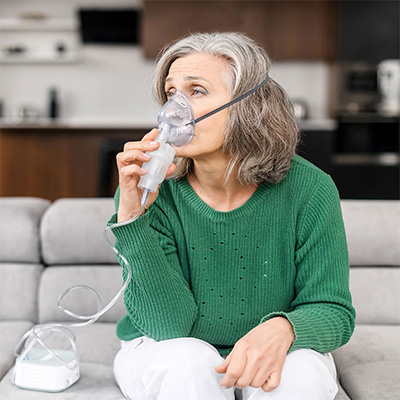Nebulizers are a form of inhaler that converts liquid medication into a fine mist inhaled by the patient. Nebulizers are used to treat respiratory conditions such as asthma, cystic fibrosis, chronic obstructive pulmonary disease (COPD), as well as allergies and infections.
There are many types of nebulizers available today, and it can be confusing to figure out which one is best for you. Keep reading this guide to find out about the different home nebulizer systems.
Nebulizer or Inhaler?
The term “inhaler” usually refers to a metered-dose inhaler, or MDI, which uses a chemical to release a puff of inhaled medication into the lungs. Inhaler devices take practice to use correctly; otherwise, the drug delivery is ineffective, as the medicine will fail to reach the patient’s lungs. There is also a version known as a dry powder inhaler, which does not rely on aerosol delivery of medication.
Dry Powder Inhalers
These types of inhalers use medicine in a dry formulation, and the patient must take quick deep breaths to take all the medication. Sometimes dry powder inhalers are used with a device called a spacer, which holds the dry medicine to make it easier to breathe in.
Nebulizers are easier to use, especially for infants, young children, the elderly, or those with dementia. Nebulizers change liquid medicine into a mist form; the patient breathes normally while wearing a facemask or mouthpiece to receive the dose. Nebulizers take five to ten minutes of treatment time to deliver the proper dosage of medication, and they rely on a power source, such as batteries or electricity, to operate.
Side Effects of Nebulizers
Side effects are uncommon, but some nebulizer users have experienced rapid heartbeat and anxiety, as well as headaches, vomiting, and throat irritation. Less common reactions include throat swelling and chest pain. If any nebulizer user experiences these symptoms, the patient should immediately contact their primary care provider.
Portable Nebulizers
Portable nebulizers are small (smaller than a soda can), portable, and battery-powered. They’re also very affordable. The price can range from $30 – $200, depending on the design and the amount of power. If you’re a frequent traveler and require medication for chronic lung disease, a portable nebulizer is a great choice.
Jet Nebulizer
These are the most common type of nebulizers for home use. Jet nebulizers use an air compressor to push a pressurized stream of compressed air through a narrow tube and liquid medicine, turning it into an aerosol. They are also frequently used in hospital healthcare settings for inhalation therapy. The main drawbacks of jet nebulizers are their size and noise generation during use.
Mesh Nebulizer
Mesh nebulizers, or vibrating mesh nebulizers, are more portable than compressor-based nebulizers. They create a mist by using airflow to force liquid medication through a mesh to create fine particles. Keep in mind that the particle size created by mesh nebulizers is smaller than other nebulizers. Many choose this type of nebulizer because it can be used with a variety of medications and is often less expensive than other types of nebulizers.
Ultrasonic Nebulizer
An ultrasonic nebulizer uses high-frequency vibrations to convert liquid into fine mist particles that can be inhaled in aerosol form. The resulting particles are larger than traditional jet nebulizers, but not as small as the particles created by mesh nebulizers. The particles are more uniform in size when compared to jet nebulizers.
Nebulizers for Asthma
Nebulizers can be very effective for pediatric asthma patients who have trouble using an inhaler. Nebulizers can utilize medications for combatting asthma attacks, including bronchodilators (albuterol, formoterol, salmeterol) to open up the airways and corticosteroids (budesonide, fluticasone, and triamcinolone) to alleviate inflammation.
Talk to Your Doctor
Your primary healthcare provider will give you the best advice on whether or not nebulizer therapy is right for you — and which type of nebulizer you should use. Always follow the advice of healthcare professionals when using an inhaler or nebulizer, and observe the manufacturer’s instructions for cleaning and disinfection of your nebulizer system. For a full range of medical products and supplies, check out what we have available at Penn Care.



